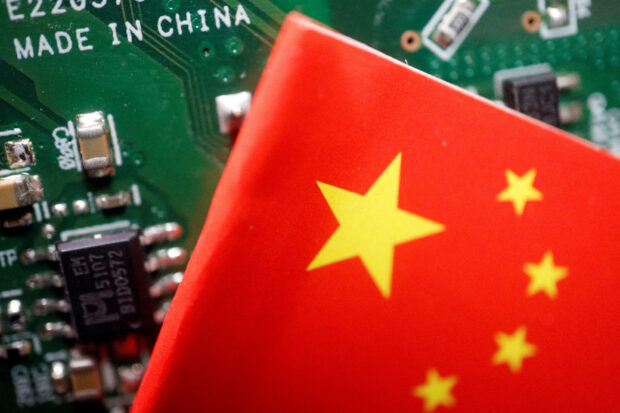China vows to open manufacturing to foreign investors

A Chinese flag is displayed next to a “Made in China” sign seen on a printed circuit board with semiconductor chips, in this illustration picture taken Feb 17, 2023. REUTERS/Florence Lo/Illustration/File hpoto
BEIJING – China vowed on Tuesday to build up industries it sees as crucial to future competitiveness, ranging from artificial intelligence to space, while offering to free up access to manufacturing and some services sectors to stem a retreat by foreign investors.
The commitments, published during the annual meeting of parliament, delivered a clear message: China is open for business, as long as it fits with a national agenda now defined by a quest for self-sufficiency.
They come as foreign investor sentiment has soured because of a weaker-than-expected economic recovery after COVID-19 and office raids by authorities, while tech innovation and self-reliance efforts have heated trade tension with the West.
“Announcements don’t move markets and promises don’t drive investment,” said Sean Stein, chairperson of the Beijing-based American Chamber of Commerce China, while adding that the announcement of reforms was encouraging.
READ: China’s parliament to unveil more stimulus this week
“The key, as ever, will be full and timely implementation.”
Although President Xi Jinping set the goal of freeing up foreign investment access to the manufacturing sector at the Belt and Road forum last October, it has done little to boost investor confidence.
Pruning ‘negative list’
The powerful state planner, the National Development and Reform Commission, also said on Tuesday it plans to relax curbs on market access in service industries such as telecoms and medical services but has not elaborated.
In 2022, Beijing pruned to 117 the number of sectors on its “negative list” which are either restricted or prohibited for market access, from a 2020 figure of 123.
In China’s automotive sector, electric vehicle makers such as Tesla have been allowed to set up wholly-owned entities, with foreign firms such as BMW and Volkswagen being permitted to take majority control of their joint ventures.
READ: China expands list of sectors for foreign investment
But shifting economic conditions have prompted a broad retreat by foreign investors from China’s manufacturing sector, while foreign direct investment shrank for the first time in more than a decade in 2023.
Last year, South Korea’s Hyundai Motor sold a joint venture plant in Chongqing as it redrew its China strategy.
On Monday, Western Digital Corporation sold a stake of 80% in a Shanghai flash memory facility to Chinese chip assembly and testing firm JCET Group.
“Foreign investors will face major competition from Chinese counterparts, so their investment decisions won’t be determined by what the government says, but by the return they receive and their global strategy,” said Dan Wang, the chief economist of Hang Seng Bank China.
Self reliance
Premier Li Qiang restated a goal posed last year by his predecessor, Li Keqiang, to boost self reliance and strength in science and technology in a drive that has intensified friction between China and the West in the past year and looks likely to continue to do so.
China has increasingly emphasized the government’s role in directing resources to achieve its goal.
READ: China’s Xi calls for tech self-reliance amid U.S. tension
Since last year, the ruling Communist party has taken a greater role in setting policy related to technology, following a major reshuffle of that ministry in a wider restructuring announced in 2023.
Its efforts so far have made some headway, for example with last August’s launch of a surprise new smartphone by US-targeted Chinese tech giant Huawei that analysts said was powered by an advanced chip developed independently in China.
Li named quantum computing and life sciences as areas China wants to open up, while vowing to step up efforts in big data, commercial space flight and artificial intelligence, besides launching science and technology programs to attain strategic and industrial development goals.
China will lean heavily on cultivating talent in areas of science and technology, Science and Technology Minister Yin Hejun told reporters on the sidelines of the meeting of the National People’s Congress, in a pointer towads a long-term strategy.
Scientists younger than 40 were leading more than 1,100 areas of key national research and development projects, he added.
“Young people … are now an important force for our country’s efforts,” he said. “In future, they will be the main force in building China into a strong nation in science and technology.”